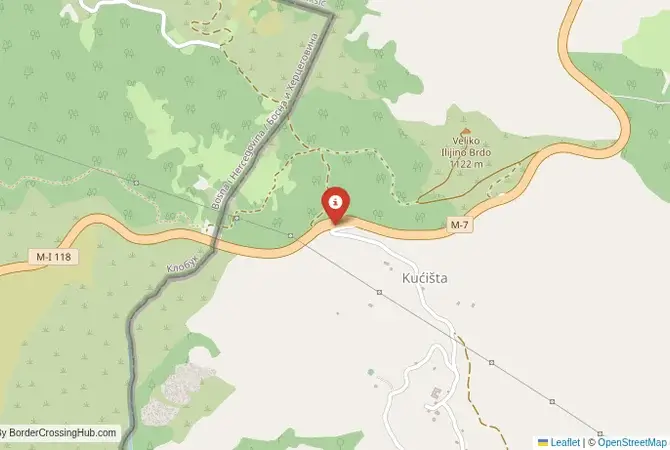
Approximate Border Location
Border Countries
Border Cities
- 🇲🇪Ilino Brdo
- 🇧🇦Klobuk
Wait Times
15-60 min for pedestrians/vehicles
Operating Hours
Open 6:00 AM – 10:00 PM
Crossing Types
Pedestrians, vehicles
Border Type
Land crossing via road
Peak Times
Mornings (7-10 AM)
Daily Crossings
~2000 travelers/vehicles
Currency Exchange
Limited near Ilino Brdo (EUR, BAM)
Safety Information
Rural, minimal crime
Languages Spoken
Montenegrin/Bosnian
Accessibility Features
Ramps, assistance
About Ilino Brdo & Klobuk Border Crossing
The Main Gateway to Herzegovina
The border crossing connecting Ilino Brdo in Montenegro with Klobuk in Bosnia and Herzegovina is the primary southern checkpoint between the two nations. This is the main highway that links the Montenegrin city of Nikšić with the historic Herzegovinian city of Trebinje. It is a busy, 24/7 international crossing, a modern facility that serves as a critical corridor for trade, tourism, and transit. To cross here is to travel through the rugged, sun-drenched limestone landscape of the Dinaric Alps, a journey from the heart of old Montenegro into the heart of Herzegovina, a land of wine, stone, and a rich, complex history.
Operational Details
This checkpoint connects the Nikšić Municipality of Montenegro with the Trebinje Municipality of Bosnia and Herzegovina. It is a full-service international crossing, open to all passenger cars, buses, and commercial freight. The facility is large and has been modernized to handle the increasing volume of traffic. It is the preferred route for most travelers and for the majority of the trade moving between central Montenegro and eastern Herzegovina. The crossing can be busy, especially during the summer tourist season, as it is on a major route for tourists from Bosnia and Serbia heading to the Montenegrin coast.
Before Crossing
Crossing borders gets messy sometimes, think political flare-ups or gates shutting fast. Good travel insurance is a must for handling doctor visits, trip disruptions, or security scares. Don’t get caught unprepared. To find a policy that’s got your back, check out reliable plans today for peace of mind.
A History of a Highland Frontier
The history of this region is the history of the highland tribes of old Montenegro and the Herzegovinian clans. For centuries, this was a remote and fiercely independent region within the Ottoman Empire, where the borders were defined by clan territories rather than state lines. The modern border, established by the Congress of Berlin in 1878 and finalized in the 20th century, divided this historically and culturally cohesive region. During the Yugoslav era, this was an internal administrative line. The breakup of Yugoslavia and the Bosnian War of the 1990s turned this into an international border. The opening and modernization of this crossing has been a key factor in the post-war recovery and the development of regional tourism.
Border Crossing Procedure
The border crossing procedure is a standard two-part process. You will first complete exit formalities at one country’s checkpoint and then proceed to the other country’s checkpoint for entry inspection. You will need a valid passport or, for citizens of many European countries, a national ID card. Vehicle registration and international insurance (Green Card) are also necessary. The process is generally straightforward, but queues can be long during peak season, so it is wise to allow for extra time in your travel schedule. The checkpoints are modern and efficient.
The Surrounding Region: Montenegro Side
On the Montenegrin side, the crossing is a short drive from the city of Nikšić, the second-largest city in Montenegro and a major industrial center. The region is known for its beautiful lakes, such as Lake Krupac and Lake Slano. The main attraction of the region is the magnificent Ostrog Monastery, a major Orthodox pilgrimage site, spectacularly built into a vertical cliff face. The road from the border also provides a connection to the capital, Podgorica, and the stunning Durmitor National Park.
The Surrounding Region: Bosnia and Herzegovina Side
On the Bosnian side, the crossing is the gateway to the beautiful city of Trebinje, the southernmost city in Bosnia and Herzegovina. Trebinje is a charming city with a beautifully preserved Ottoman-era old town, a famous stone bridge, and numerous Serbian Orthodox monasteries, including the magnificent Hercegovačka Gračanica, which offers stunning panoramic views. The city is the center of a wine-producing region and is known for its relaxed, Mediterranean atmosphere. The crossing is also a gateway to the famous city of Mostar, with its UNESCO-listed Old Bridge, and the Croatian city of Dubrovnik.
Practical Travel Information
Practical planning for this route is straightforward. The main highway is well-maintained. The official currencies are the Euro (EUR) in Montenegro and the Bosnian Convertible Mark (BAM) in Bosnia and Herzegovina. Currency exchange facilities are available at the border, but rates are often better in the cities. Ensure your vehicle’s Green Card insurance is valid for both countries. Services like petrol stations are readily available on the main route.
Final Considerations
The Ilino Brdo–Klobuk border crossing is the main artery connecting central Montenegro with eastern Herzegovina. It is a busy, functional checkpoint that serves as a gateway to the rich historical and cultural treasures of both nations. The journey through it is a passage through a shared landscape of rugged mountains and a complex, intertwined history. For the modern traveler, it is a straightforward and essential route for exploring the diverse natural and cultural wonders of this fascinating Balkan borderland.
See other crossings between Montenegro and Bosnia and Herzegovina
See other crossings between Montenegro and Bosnia and Herzegovina
No reviews yet.
